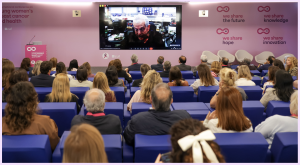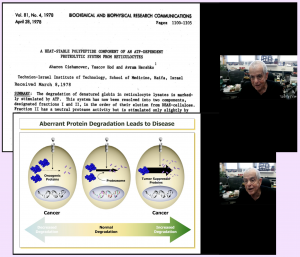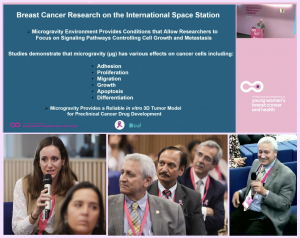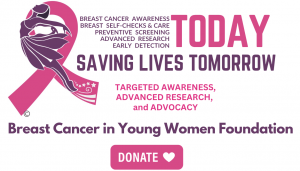The International BCYW Conference Celebrated Two Pioneers in Medicine and Innovation: A Nobel Laureate and an Astronaut
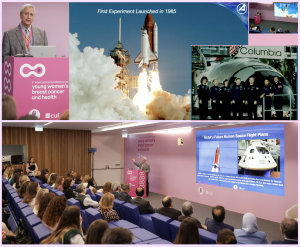
Dr. DeLucas Speaking About Space Research. He flew aboard the NASA Space Shuttle Columbia as a Payload Specialist.
Two Global Pioneers in Medicine and Innovation Delivered Groundbreaking Insights on How Innovation Could Advance the BCYW Foundation’s Fight Against BCYW.
DENVER, CO, UNITED STATES, December 9, 2024 /EINPresswire.com/ -- The recently concluded International Conference on Young Women’s Breast Cancer and Health1 brought together global thought leaders, medical pioneers, and advocates to address critical challenges in Breast Cancer in Young Women (BCYW)2.The conference spotlighted innovative solutions, enhanced community support, strengthened patient advocacy, and preventive strategies for promoting health among young women. Two of the world’s leading figures in science and innovation headlined the event, delivering groundbreaking insights into how innovation might help the
NOBEL LAUREATE AARON CIECHANOVER ON PROTEINS AND CANCER THERAPEUTICS
Prominent biochemist and Nobel Laureate Dr. Aaron Ciechanover, M.D., D.Sc., from the Technion-Israel Institute of Technology, delivered an insightful lecture titled “The Ubiquitin Proteolytic System: The Journey from a Vague Hypothesis to Efficient Anti-Cancer Drugs.” In his talk, he explored the ubiquitin-proteasome system’s pivotal role in regulating protein degradation and its transformative implications for treating cancer and other diseases.
Dr. Ciechanover remarked, “The problems you (the BCYW Foundation) are studying and discussing are very familiar to me. I have operated on many women with breast cancer, and my work in this field began many years ago—well before cancer in young women became a widely recognized issue. Thank you for identifying this critical problem. However, the issues extend beyond breast cancer to include ovarian cancer, liver cancer, and others.”
Key Highlights from the Lecture include:
• Malignancies in Young Adults
Dr. Ciechanover addressed the alarming rise of cancers among young people: “The question that haunts us is: why? Why are young people developing malignancies that we hadn’t seen in the past? This is a phenomenon that has emerged in the last decade, maybe slightly longer, and we still haven’t pinpointed the reasons. Is it diet? Drinking water? Obesity? Climate change? Increased exposure to radiation during air travel? We simply don’t know.”
He stressed the broader societal implications of young women's breast cancer: “Cancer is now devastating young people, and your efforts to draw attention to this crisis are invaluable. The societal awareness, the conference uniting physicians and scientists, and the collective research efforts are critically important. I commend you for this.”
• Foundational Research and the Nobel Prize
Reflecting on his groundbreaking studies, Dr. Ciechanover shared how his early work in the ubiquitin-proteasome system, published in a lesser-known scientific journal, ultimately became pivotal to his co-receipt of the 2004 Nobel Prize in Chemistry. He emphasized that “I aim to show you how foundational curiosity-driven research has shaped the future of drug development. This approach has the potential to continue transforming how we understand and treat devastating diseases.”
• Role of the Ubiquitin-Proteasome System
- Dr. Ciechanover highlighted this system’s role in maintaining cellular health by removing damaged or excess proteins and regulating protein turnover. Dysregulation of the system contributes to various diseases:
- “Excessive protein degradation can deplete tumor suppressors in cancer,” he explained.
- In contrast, “Inadequate degradation contributes to toxic protein accumulation in diseases like Parkinson’s and Alzheimer’s.”
• Therapeutic Advances
Dr. Ciechanover discussed the revolutionary therapeutic potential of targeting the ubiquitin-proteasome pathway. He detailed advances like proteasome inhibitors, proteolysis-targeting chimeras (PROTACs), and molecular glues that tag harmful proteins for degradation. These therapies promise significant breakthroughs in treating breast cancer and other complex diseases.
ASTRONAUT LARRY DELUCAS ON SPACE AND CANCER RESEARCH
A NASA astronaut and former principal scientist at the International Space Station (ISS), Dr. Larry DeLucas, Ph.D., provided an inspiring perspective on how space exploration contributes to cancer research, including breast cancer.
His presentation, titled 'Space Exploration and Cancer Research on the International Space Station,' emphasized the groundbreaking potential of microgravity studies for developing effective cancer therapies.
Key highlights of Dr. DeLucas' talk included:
• NASA’s Technological Innovations: He detailed NASA’s advancements, such as the James Webb Space Telescope, and its ongoing efforts in human space exploration and the search for extraterrestrial life. Dr. DeLucas also discussed the challenges of deep-space missions and their impact on advancing health sciences.
• Microgravity’s Impact on Cancer Research: Experiments conducted aboard the ISS reveal how microgravity affects cancer cell behavior, including growth, migration, and apoptosis. These studies provide a unique three-dimensional tumor model to explore signaling pathways and test preclinical drugs.
• Breast Cancer Breakthroughs: Research indicates that microgravity can alter breast cancer cells, pushing them toward a less aggressive phenotype. This discovery opens new avenues for developing targeted treatments and improving patient outcomes. Additionally, microgravity-based studies have shown potential for enhancing drug efficacy and understanding metastatic mechanisms. Dr. DeLucas stressed the importance of leveraging space-based research to gain insights into cancer biology and treatment innovation.
A VISION FORWARD
Both speakers reinforced the necessity of fostering global collaboration, prioritizing early detection, and accelerating therapeutic development. Their inspiring talks highlighted the transformative role innovation might play in addressing the unique challenges posed by breast cancer in young women. The International Conference on Young Women’s Breast Cancer and Health concluded with a renewed commitment of the BCYW Foundation for advanced targeted research.
ABOUT THE BCYW FOUNDATION
The Breast Cancer in Young Women Foundation (BCYW Foundation) is a global organization dedicated to advancing research, raising awareness, and providing support to young women affected by breast cancer. Through partnerships and advocacy, the foundation is committed to creating a future where no young woman feels overlooked in her fight against this disease. The BCYW Foundation relies on individual contributions and sponsors to raise the funds necessary to support its mission.
Donate to BCYW Foundation3: Every contribution – big or small – helps the BCYW Foundation fulfil its mission to save the lives of young women from breast cancer in the years to come. Thank you for your generosity.
Rakesh Kumar, Ph.D., Founder and CEO
Breast Cancer in Young Women Foundation
bcywf@breastcancerinyoungwomen.org
1 https://www.einpresswire.com/article/759649353/
2 https://breastcancerinyoungwomen.org/
3 https://breastcancerinyoungwomen.org/donate-save-young-lives-from-cancer/

